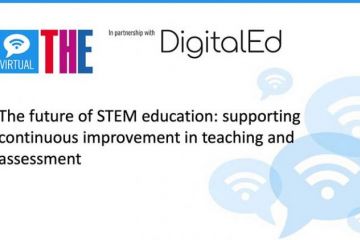University teachers have been urged and may soon be ordered to inculcate in students 'core', 'key' and 'transferable' skills. But, asks Terry Hyland, what do these worn words mean without a specific context?
It really is amazing how academics can be cajoled into overlooking fundamental questions of meaning, consistency and validity when faced with fashionable slogans, particularly those attracting the support of employers and powerful quangos. University teachers have recently had to suffer inspections based on ill-defined notions of "quality" and "standards", and are now being asked by the Department for Education and Employment to take seriously concepts of "graduateness" which incorporate transferable "employability" skills.
Such skill-talk has been popular in educational debate since the 1970s when it emerged as a key element of the "new vocationalism" initiatives of the period. Popularised through General National Vocational Qualifications (GNVQs), (which are built around the notion of "core skills") and reconstructed as "key skills" in Sir Ron Dearing's 1996 review of 16-19 qualifications - such broad-based, so-called generic skills are now meant to underpin just about every aspect of education and training in Britain.
Earlier this year there was even a national test launched designed to test a graduate's "working style and business acumen". The Graduate Employability Test is based on similar United States tests and examines the skills that employers are assumed to want. It seems timely to take a long, hard look at the nature and validity of such alleged skills.
There are two main criticisms of claims about general, transferable skills in higher education, whether they are described as core, generic, or key. First, since there is no common definition of such skills - with proponents disagreeing about whether skills apply to outcomes of behaviour, ways of thinking or the attitudes, values and personality traits of students - skill-talk is fatuous and redundant.
Second, if by "core skills" we mean skills that can be applied regardless of the situation or context (and clearly such wide applicability is what much skill-talk aims to prescribe) then such skills can be shown, on empirical grounds, to be entirely illusory.
Most lists of core skills - including the computer, communication, leadership and problem-solving skills listed in the Graduate Employability Test - are based either on what employers claim they want or what educators think industry needs. Perhaps it is this broad remit and nebulous general/practical mix which gives rise to skills as diverse as "cutting with one blade" and "conversing with one person" (Further Education Unit, 1982), to "working with others and improving one's own learning performance" (National Council for Vocational Qualifications, 1993) to, at the highest level of generality, the omnibus "thinking" skills advocated by philosophers such as Lipman and Scriven, and the psychologist de Bono.
Moreover, the whole thinking skills project can be challenged by the argument that, since thinking is by definition always about "something", the context-dependency of this "something" rules out the possibility of any general thinking skills.
Belief in the existence of free-standing thinking skills is based on a number of fallacies. If a person has acquired a skill in one context, say, writing a report - and is able to repeat this skill in other contexts - there is a tendency to generalise that skill to all contexts. Hence, some form of "report-writing" skill might be posited, overlooking the fact that "report writing", like "problem-solving" and, for that matter "communication", means little until placed within a particular framework of knowledge, beliefs and assumptions.
Problem solving in physics has little in common with problem solving in history, and communication in literature or sociology is vastly different from communication in business studies.
Another fallacy is based on the inference of a common skill by mixing together a number of attributes. Thus "working with others" or "identifying value judgements" may be amalgamated to build up a foundation for otherwise incomprehensible conceptions such as "leadership" and "inter-personal" skills.
High achievement in such basic spheres as literacy and numeracy is self-evidently desirable, and it is easy to see the attraction of being able to transfer the apparent objectivity of such achievements to other spheres.
It is, after all, in the interests of educators as much as industrialists to identify precise objectives which justify a high investment in learning. However, such natural inclinations should not blind us to the sophistry and fundamental confusion surrounding claims about core skills.
The bulk of the empirical evidence is against the existence of general transferable thinking skills. The research on the way professionals develop expertise in different fields demonstrates clearly that all high-level skills (and many low-level ones also) depend on the context or situation in which they are being used. "Problem-solving" or "working with others" are notions which are meaningless until they have been supplied with a particular context supported by a domain of knowledge, beliefs and values. Without such specificity, such putative skills have no more validity than, say, the concept of wisdom or friendship skills.
The attraction of core/key skills to university teachers is obvious. But higher education is not unduly short of mythical objectives at present and lecturers have more than enough to do without pursuing chimeras.
Terry Hyland is at the department of continuing education, University of Warwick.
Register to continue
Why register?
- Registration is free and only takes a moment
- Once registered, you can read 3 articles a month
- Sign up for our newsletter
Subscribe
Or subscribe for unlimited access to:
- Unlimited access to news, views, insights & reviews
- Digital editions
- Digital access to THE’s university and college rankings analysis
Already registered or a current subscriber?








